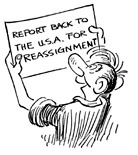
On Being Pulled Back to America
AN EXILE COMES HOME
I don’t quite know how it started. Gradually, during six years in Europe, I came to understand why so many from all lands have done all they could to come to America. My father, New Yorker that he was, never liked to leave New York: He insisted that since all the world seemed to be coming there, it must be the place to be. Perhaps it began when I was again struck by that which had so powerfully impressed me on my first high school trip to Europe 30 years ago: walls. Europe is a place of walls. Visibly, the landscape was walled or hedged in — definitions written in stone. But more was delineated, written in stone, than fields: Who you are and where you fit in the social order are determined long before you are born, and there is little changing it. Petrified identities. Everyone knows just who everyone else is and what they are like; the rich and powerful nations of Europe were always rich, the poor nations were always poor. They just “are” that way. More: I came to see that somehow too little of consequence had changed in the past 30 years.
Perhaps it was seeing Germans repenting of their postwar repentance — the skinheads and neo-Nazis and the Germans’ tolerance of them — that robbed me of well-painted illusions. Being as engaged in eastern Europe as I have been, seeing things largely through those lenses, prompted in me a feeling of despair for Europe. Not a despair for Christian Europe, nor its fruits in European culture, not Bach, Mozart, Michelangelo — Gorecki. Certainly not a despair for the Church in communion with John Paul II, calling for a re-preaching of the Gospel, often in lands where its roots may never have been that deep. But even in his homeland, John Paul’s voice seemed largely scorned by the elites, by the media names. I was horrified by the sophisticated neo-pagans of Europe who would make of culture a religion, forgetful of the orchestra playing Beethoven at the entrance to concentration camps as the inmates were entering. That should have served as a symbol and warning of what a Europe that is not Christian would look like, but it was a blatant symbol somehow ignored in our mauve-upholstered times, and at any rate one exclusively appropriated by the Jewish victims of that paganism.
I had moved to Europe in 1987 to go home, in a way, even as my maternal grandfather had left Minnesota over 50 years before, convinced that it was better to be with one’s own, to be in a place where one’s name would not always be foreign, convinced that there were differences in mentality too big to bridge. He had returned to a newly reconstituted Poland, only to spend most of his life in a whirl of armies and systems in an eastern Poland (historically Lithuania) that finally disappeared and became part of another entity entirely, the U.S.S.R. Some of his children had escaped that inferno to await better days, and returned to the land of their birth (the U.S.); one of them is my Polish-American mother.
So I spoke the languages of that part of the world — Polish, Russian, and Byelorussian — those of the natives and those of the invaders as well. I have written before of some of the things that caused me to look to Europe for a home (NOR, Dec. 1992). I lived in Rome and wrote a doctoral dissertation there; I was headed for work on behalf of the Church in Russia, and traveled to Poland where, in a village on the Baltic coast, I spent a year in spiritual formation (tertianship) before heading into full-time ministry. And it was there that another call came.
You May Also Enjoy
Innumerable Catholics have lost sight of the privilege they have received and shy away from proclaiming the glory of the one true Church.
Reviews of Solzhenitsyn and the Modern World... An Introduction to Moral Theology... George Grant: A Biography... ...
Review of Nicaragua's Other Revolution: Religious Faith and Political Struggle

